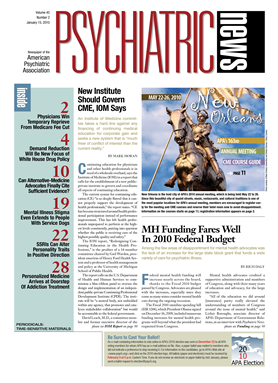Despite the advent of clinical trials and population-study data, clinicians know that treatment of each patient can be an unpredictable course and a “clinical trial of one.” In recent years, discoveries in pharmacogenetics, epidemiology, and neuroscience have been quietly moving addiction psychiatry toward the brink of highly personalized medicine.
At a symposium at the 2009 American Academy of Addiction Psychiatry annual meeting in Los Angeles last December, researchers presented tantalizing new findings from different areas. These findings suggest that personalized and highly effective addiction treatments may be just around the corner.
Currently, clinical diagnosis of various addictive disorders is based on considerable heterogeneity and lacks specificity, said Mark Willenbring, M.D., at the meeting “In clinical trials, we treat everyone the same,” he said. He believes, however, that personalized medicine “may in fact be closer than you think” and some technologies “are ready or very close to being ready for prime time.”
Willenbring retired recently as director of the Treatment and Recovery Research Division of the National Institute on Alcohol Abuse and Alcoholism.
Advancing the research and application of personalized medicine is one of the current priorities of the National Institutes of Health.
Personalized medicine will allow clinicians to assess an individual patient's ailment more accurately, form a reliable prognosis, and predict the likelihood of the patient's response to treatment, which will transform the current “trial-and-error or intuitive clinical experience” in patient care, according to Willenbring.
Gene Mutation Predicts Naltrexone Efficacy
Pharmacogenetics and pharmacogenomics both provide major contributions to personalized medicine. David Oslin, M.D., an associate professor of psychiatry at the University of Pennsylvania Medical Center and Philadelphia Veterans Affairs Medical Center, discussed the effect of a single genetic mutation on large differences in patients' response to naltrexone treatment.
The A118G polymorphism is a fairly common mutation in the gene coding for the mu-opioid receptor, which has been extensively studied. A sizable minority of Americans of European descent—between 24 percent and 36 percent—carry at least one copy of the G allele (risk allele). Having either the A allele or the G allele results in a different amino acid within the protein and causes a large difference in the abundance of mu receptors. Experiments in humans have shown that G allele carriers (A/G or G/G) have a much smaller change in pupil size in response to the same dose of morphine than homozygous A/A allele carriers, Oslin explained.
“From a vast array of literature, we know the polymorphism plays out in many clinical aspects such as pain, reward, alcohol, [and] narcotics,” said Oslin. He and colleagues analyzed the mu receptor polymorphism in patients with alcohol use disorder who had participated in a clinical trial of naltrexone versus placebo. They found that individuals with at least one copy of the G allele responded significantly better to naltrexone than did A/A allele carriers.
A genetic reanalysis on the Combining Medications and Behavioral Interventions for Alcoholism (COMBINE) trial replicated this finding, Oslin said. Patients with at least one G allele showed more robust effect of naltrexone compared with placebo. In A/A carriers, however, the response to naltrexone was similar to that of placebo.
Alcoholism and Genotypes Are Interacting
This phenomenon is not an interaction between naltrexone and genotypes, but rather an interaction between alcoholism and genotypes, Oslin pointed out. In previous studies, carrying the G allele was associated with a self-described sense of reward and stimulation after the first drink, which is not shared by A/A carriers. In other words, their etiology of alcoholism may be different.
These data have immediate implications for clinical practice, as the prevalence of this mu receptor polymorphism varies among different ethnicities. The G allele is almost nonexistent in people of African descent, but more common in Asians than in Caucasians, according to Oslin. This was consistent with a reanalysis of COMBINE data, which found no effect of naltrexone relative to placebo in African-American patients.
Oslin also pointed out that although the genetic test for this polymorphism is not yet commercialized, it would not be impractical when it becomes available. In his clinical trial, one test cost about $75, and the result was available in only a day or two. He cautioned, however, that current evidence about this polymorphism is still retrospective, but two ongoing prospective studies will probably clarify the issue. “We are a couple of years away from genotyping patients,” he said.
Executive-Function Boost Fights Addiction
Warren Bickel, Ph.D., has been studying addiction in the context of “competing neurobehavioral systems” (Psychiatric News, March 6, 2009).
Bickel is a professor of psychiatry, the Wilbur D. Mills Chair of Alcohol Abuse and Drug Prevention, and director of the Center for Addiction Research at Psychiatric Research Institute at the University of Arkansas for Medical Sciences. His laboratory has produced evidence to suggest that in patients with addiction to substances, alcohol, overeating, or risky and self-destructive behaviors, the normal balance between executive function and impulsivity is significantly disturbed.
At the symposium, Bickel presented the possibility of using brain-training tools to boost effectiveness of addiction treatment.
Bickel cited neuroimaging studies to illustrate that impulses are generated in the limbic and paralimbic system, which is hyperactive in persons with addiction, while rational control is exerted by the prefrontal cortex, which is hypoactive in the brain of addicted people.
Impulsiveness Measured in Lab
Various researchers have used the technique known as future discounting to measure a brain's balance between the impulse-driven system and executive-function system. A reinforcing stimulus such as the prospect of receiving $1,000 almost invariably loses value relative to time delay. People instinctively prefer receiving $1,000 now to $1,000 in a month, but may be persuaded to accept, say, $1,000 in a month over $500 today.
A functional magnetic resonance imaging study showed that when a person made a decision favoring immediate reward, there was greater activity in the limbic and paralimbic systems. When the person chose the distant reward, the prefrontal cortex lit up. The “discount” of future reward thus reflects the competition and compromise between the two systems.
Bickel presented clinical data showing that individuals with heroin addiction assign a far greater discount to the future than do controls without addiction. In other words, the same amount of future reward loses a lot more value quickly when the brain is hijacked by addiction.
“In research studies conducted so far, greater discounting has been associated with virtually every form of addiction—cocaine, opiates, cigarette smoking, sedatives, problem gambling, obesity, risky sexual behavior, debt—and outcomes in behavior-change clinical trials,” Bickel noted.
In this theoretical framework, he took a step in a different direction—backward. He tested people's intuitively assigned value of imaginary past rewards. Unexpectedly, test subjects showed the same pattern: the further into the past a reward is presented hypothetically, the more its value was discounted. People appear to prefer $1,000 yesterday to $1,000 a month ago.
The curious finding of past discounting suggested to Bickel that “we may need to reconsider discounting as a measure of impulsivity.” In other words, the exaggerated impulsivity observed in addiction may be a symptom of impaired working memory or the brain's inability to see very far in time both backward and forward.
Bickel and colleagues are currently studying the effect of executive-function therapy in persons with addiction to stimulants and alcohol. “If the past and future are tied together, there may be a causal relationship between impulsive behavior and executive function,” he said.
In one of their yet-to-be published studies, Bickel and colleagues randomized persons with stimulant addiction to receive either a computerized memory-rehabilitation treatment, originally designed for traumatic brain injury, or a control treatment (i.e., answers to test questions were given so that no mental effort was needed). About 14 patients were assigned to each group. After five weeks of treatment with three one-hour sessions a week, nine participants in the active-treatment group, versus two in the control group, showed a significantly decreased level of future discounting, implying that they had more operative executive function.
Although the study was small, Bickel believes his group is onto something meaningful. Next, they will analyze if the change in discounting leads to patients' outcomes in addiction treatment. “I hope to tell you more in a couple months when we have more data,” he said.


